Uber's Internal Hacking
Uber's internal communications were momentarily hampered by a security breach, providing one of the most glaring examples of how digital businesses with access to the best expertise and resources can still be repeatedly compromised.
- The incident, which started on Thursday, forced Uber to take the precautionary measure of restricting employee access to internal services like Slack, Zoom, and Gmail
- As of Friday morning, the company announced that access to those systems was being restored. It also said that it had no proof that the breach involved access to "critical user data" such as riders' travel records
MFA Fatigue
Uber disclosed that the person behind the intrusion initially gained access to the network by using a contractor's login information which might have been purchased on the dark web. It then made numerous attempts to access the contractor's account using these credentials. The victim allegedly received numerous requests for multi-factor authentication in response to the login attempts, and he ultimately authenticated one of them. According to earlier claims made by the hacker, a social engineering approach was used to persuade the contractor to verify the login attempt.
- This exploit is what security professionals refer to as "MFA fatigue." This increasingly popular intrusion technique aims to bombard the target with requests for authentication until they approve the hacker's login attempt
- The most intriguing assertion made by Uber is that the cybercriminal gang "LAPSUS$" is connected to whoever was responsible for this incident. It's unclear exactly how Uber knows that
- Rockstar Games was this week the victim of a hacking incident that resulted in the publication of Grand Theft Auto VI gameplay footage in a rather unfinished state. The hackers who caused this asserts they are also responsible for the Uber hack
Profits Over Security?
Not a single tech company is "on the safe side". Weeks prior to the Uber incident, Twitter Inc.'s former head of security filed a whistleblower complaint alleging "extreme, egregious inadequacies" in a number of areas, including privacy and digital security. Peiter Zatko, a former executive, testified before lawmakers earlier this week that Twitter executives prioritized profits over security due to financial incentives.
- Zatko was hired by Twitter after experiencing the worst attack in company history a little over two years ago
- In that incident, a Florida teenager deceived a Twitter employee into believing he was a fellow employee
- He was then able to get over Twitter's security measures and access a number of accounts, including those of Kanye West, Barack Obama, and Elon Musk
Disclaimer
Please note that this article does not constitute investment advice in any form. This article is not a research report and is not intended to serve as the basis for any investment decision. All investments involve risk and the past performance of a security or financial product does not guarantee future returns. Investors have to conduct their own research before conducting any transaction. There is always the risk of losing parts or all of your money when you invest in securities or other financial products.
Credits
Photo by Markus Spiske on Unsplash.






